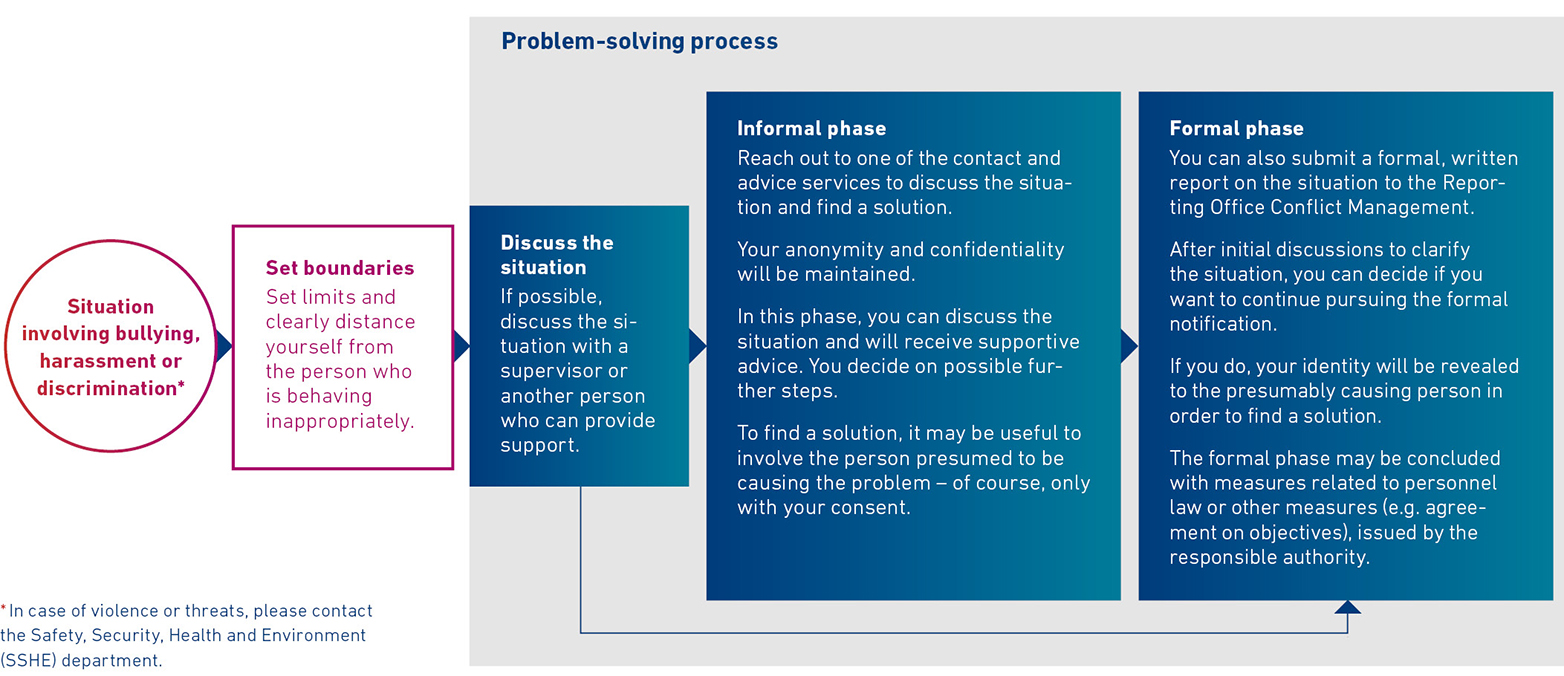Finding your way through difficult situations
For those experiencing serious conflicts, threats or abuse in the workplace, it can often seem as though there is no way out. New regulations set out the procedure for dealing with difficult situations at ETH.

Markus T.* doesn't know what to do. The young scientist is using a laboratory at ETH for his doctoral work. He has been going there almost every day for over a year now. He enjoys his work, and to begin with he feels that he fits in well at the lab. When a set of samples is rendered unusable due to carelessness on Markus’s part, it takes a lot of extra effort from the research group to rectify the damage.
One colleague is clearly resentful about the incident. He holds back at first, but then starts criticising Markus and his work in conversations with colleagues. He also makes derogatory comments directly to Markus, insinuating that he isn’t up to the task and should look for another job. More and more of Markus’s colleagues turn their backs on him and he feels as though he has no support. He tries to talk to the team leader about the situation but gets nowhere. He feels increasingly isolated and unhappy. Eventually, Markus looks at the Respect section of the ETH website and makes an appointment with ETH’s new external ombudsperson.
Ask for advice early on
“Markus T. is doing the right thing,” says Ernestine Hildbrand, a project manager in Human Resources. “Anyone who feels that there is a problem with their working environment should raise the issue with the appropriate contact person. Particularly if they feel they are being treated unfairly, harassed or even threatened.” If possible, she recommends speaking to a manager or supervisor as the first port of call.
The range of contact and advice services available at ETH has grown over the last year, partly in response to incidents in previous years where employees were not shown the respect they deserved and conflicts occurred as a result. ETH has therefore appointed an external ombudsperson and launched Respect, an internal advice and conciliation service that specifically offers advice and assistance in cases of bullying, harassment and discrimination. An external, independent advice centre is also available.
“At ETH Zurich, we expect everyone to treat each other with respect and appreciation,” stresses Lukas Vonesch, Head of Human Resources. “We will not tolerate infringements of the ETH Code of Conduct – we will take action in consultation with those affected.” The specific procedure to be followed when members of ETH Zurich report cases of inappropriate behaviour is set out in the regulations that came into force on 1 September 2020.
Involvement of all university groups
The ombudspersons, the University Assembly and the four university groups – including the Academic Association of Scientific Staff at ETH Zurich (AVETH) and the Association of Students at ETH Zurich (VSETH) – were all involved in putting together the regulation. Werner Wegscheider, Professor of Solid State Physics and President of the University Assembly, is satisfied with the result: “The roles of the various contact and advice services are now clearly defined.” This also applies to the ombudspersons. Alongside the development of the regulation, the relevant provisions of the ETH Organisation Ordinance have also been revised.
Some of the greatest improvements lie in the details: “For the person reporting the problem, for example, it is important that the specialists are only permitted to revoke the anonymity of the person in question in the course of their investigations if that person gives their consent.” There had been some uncertainty in this area in the past, he explains. “I am glad that we now have clear rules on how to handle anonymity, how to protect both sides and how to ensure a fair and confidential process,” says Wegscheider.
Clear processes
The main characteristic of the reporting process is its two-part structure. In the initial, informal phase, the aim is to work with the person concerned to try and find a solution as quickly and easily as possible. In this phase, it is important that the person who reports the problem is in control of the next steps, that they are actively involved in the process and that their problem is handled confidentially. The focus in this phase is generally on personal advice and support. The specialists can organise a mediation, but only if requested by the person concerned.
If necessary, the person reporting the problem can move on to the next step and submit a written report to the Conflict Management Reporting Office, thus initiating the formal phase. Anonymity is revoked in this phase, as both parties need to be heard. “The University Assembly believes that the two-part process is very sensible,” says Wegscheider. “In particular, the fact that conflict management has been introduced at the interface between the phases. The person charged with this task makes another attempt to reach an early agreement.”
Help is available wherever you look for it
So how does Markus T. find out which is the best service to contact in his situation? In other words, will it affect the process if he contacts the external ombudsperson rather than the internal one or the Respect specialist unit? “Not at all,” stresses Hildbrand. “You can choose to contact any of the services with your initial concerns and you can be confident that the matter will be taken extremely seriously by the service in question.” Depending on the skills required for a particular case, you may be referred to another service if necessary. “The important thing is to contact one of the services at an early stage and get some advice. The sooner you do that, the easier it is to identify and de-escalate a conflict situation,” says the HR expert.
University Assembly President Wegscheider agrees: “The fact that ETH is now offering a wide range of low-threshold contact services is a positive sign and one of the most important aspects of these changes.” In the discussions about the regulations, the University Assembly was also particularly keen to ensure that people who report problems receive appropriate protection in a timely manner. “This will ensure that those seeking advice will actually use the services,” says Wegscheider.
As is the case for Markus T. After a number of consultation sessions, he agrees to discuss the situation with the whole research group. The discussions are challenging for the whole team, but ultimately they are able to clear up their misunderstandings and the atmosphere in the team improves significantly.
Of course, having regulations does not guarantee a solution. “But people like Markus T. and other parties involved in a conflict situation now know that there are concrete services and processes that can be used to de-escalate the problem,” says Vonesch, Head of HR. “I think just knowing that can stop you from reaching the end of your tether.”
*Name and situation are fictional.

This text was published in the employee magazine "life" 3/20" starting from page 11.


Comments
No comments yet